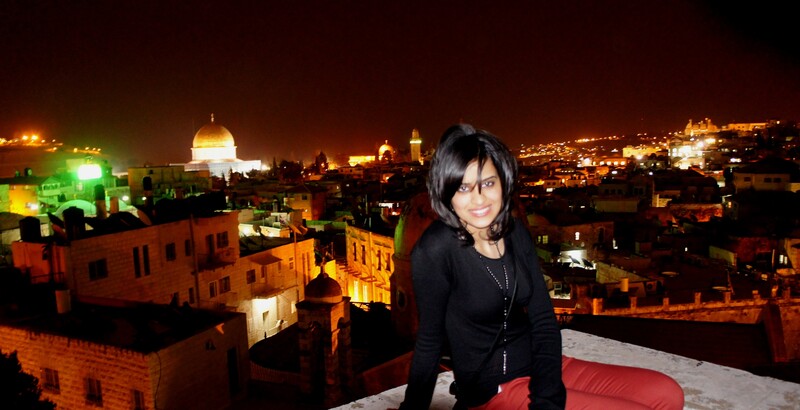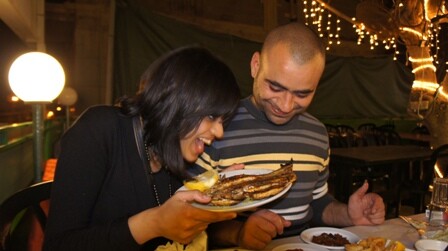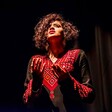25 March 2012
If you didn’t read PART 1 and PART 2 of my story, kindly start there to read.
The long hours of waiting inside the bus without moving gave me a backache, but I couldn’t complain with many elderly and sick people surrounding me. An old woman sat to my right. I could read many stories of struggle and suffering in her wrinkles, her traditional Palestinian dress, and her tight eyes. She wore a brace around her neck. I could hear her muttering prayers.
Due to Israel’s apartheid checkpoints, it took us a day to reach Jericho from Amman, approximately one hour from Allenby crossing between Jordan and the occupied West Bank. I waited eagerly, imagining myself walking around the Old City of Jerusalem before heading to Gaza. We wasted more than four hours waiting for the Israeli soldiers to let us pass through their checkpoints. Being from Gaza made my crossing procedures even more complicated. I spent the whole trip to Jericho counting the minutes and hours. The more time we wasted, the less likely it became for me to tour Jerusalem. The time limit that Israel imposed by closing Erez at 7:00pm made me anxious.
At sunset, I finished all the crossing and security procedures. I hurried to the exit to find my taxi driver sweating, standing by his parked car next to the door waiting for us. He rushed me inside the car, saying that he had to drive me to the District Coordination Offices (DCO) right away to get a permit to leave before it was too late. People from Gaza get permits to cross through Erez back to Gaza there, and people from West Bank get permits to enter Jerusalem and other “Israeli” territory.
On the way to Jordan, I tried my hardest to stop in Jerusalem and visit the Odeh family, whose son Loai was deported to Gaza after his release in last October’s prisoner swap deal. Loai and I became close friends as soon as we met. Before I left Gaza, I promised him that I would do my best to visit his family and give them a hug on his behalf. I couldn’t on my way to Jordan. But I insisted on making it happen when I returned.
As luck would have it, fate smiled on me and because the DCO had already closed, and wouldn’t open again until the morning, I found the opportunity to realize my dream of meeting Loai’s family — even if it meant risking arrest for “illegally” entering my homeland.When I finally made it to Jerusalem, the first person I called was Loai. “I’m now heading to Jerusalem, to meet your family!” I screamed with happiness.
Loai instructed me to meet his brother Obay at a Jerusalem hotel, laughing and sharing in my joy.
I had never met Obay, but I felt like I already knew him. We talked briefly once when Loai was in Egypt. He introduced us on Skype. Loai had told how special their relationship was, especially after they were reunited in prison. They shared a cell together for over two years before Obay, who was detained in 2002 as a child at the age of 17, was released in 2006. They met again in Egypt last January. I could see many similarities Obay shared with Loai — appearance, behavior, way of thinking and even their expressions — that made me feel closer to him.

Me inside the old city of Jerusalem.
The people who remained in Jerusalem suffer the most from Israeli occupation and apartheid. While wandering around, we saw many people sitting outside their homes chatting. I passed by a group of girls in a courtyard. They were very welcoming and loving when they learned I came from Gaza. I asked them about the occupation, with which they interact daily. “We will never leave our homes even if it costs us our lives,” one of them replied. “Israel offered to buy these old, small houses with unbelievable amounts of money, but we never gave them up and never will. Our resistance is to stay here, despite all the mocking, humiliation and violations of our rights.”
I was thrilled by her answer. A young girl among them grabbed me to introduce me to her family. I was shocked to see how narrow her house was. They had only one room, where nine people live, including her parents.
I kept walking. I could see Hebrew graffiti on the walls and Israeli flags. It’s not only a sad city, but also an angry one. I could sense its anger shaking the floor beneath me, as if it was saying, “My tongue is Arab and my identity is Palestinian.”

The electrical wires of Palestinians’ houses inside the old city of Jerusalem
I followed Obay wherever he went. We climbed snaky stairs until we reached a roof, where an Israeli soldier suddenly came outside to ask why we were there. Obay answered calmly, “Just to see the city from the top.”
I didn’t know exactly where I was, and the soldier, who was monitoring screens connected with cameras spread all over the city, made me nervous. Then Obay pointed. I turned to where his finger stopped to discover that the Dome of the Rock and al-Aqsa Mosque were right in front of me. I opened my eyes wide and sighed. The exceptional beauty of the golden dome glittered and lit up the dark sky.
No matter how long I meditate on this magnificent view, my eyes will stay thirsty. But we had to leave. Obay had a nice plan to make use of my only night there. I couldn’t believe my ears when I heard that our next destination was Jaffa. It was always a dream, but one in the back of my mind, which I thought would be impossible to reach. We headed there in the car. Being in Jaffa increased my longing to return to Beit Jerja, my original village, where my grandparents were ethnically cleansed in 1948. The refugees’ return is a right, not just a dream, and it will be fulfilled someday.

Obay and I are eating fish in a resturent overlooking Jaffa’s beach
Immediately after we finished eating, I ran toward the seashore in my bare feet to wet them and feel the warm waves. I kept walking, paying no attention to time or distance, while breathing Jaffa’s pure air and collecting beautiful seashells to keep as souvenirs. It felt so harmonic and spiritual. I never stopped thinking about my people in Gaza, who were very near, but could never reach this side of the Palestinian beach.
I wished I could watch the sunrise there, but we had to go back to Jerusalem a little earlier, as Loai’s father was worried about us. I couldn’t complain about anything. I received more than I expected. I repeatedly described how happy I was this way: “I am afraid I will die from too much happiness.” I hoped for at least an hour in Jerusalem, and unexpectedly, I had a whole night in both Jerusalem and Jaffa. Alhamdullah, God was very generous to me.
It meant a lot to be at Loai’s house. His pictures hung everywhere, even in the garden. I caught only two hours of sleep before I had to leave the house to get a permit from the DCO. Before I said goodbye to Loai’s family, I took pictures of every corner of the house to show Loai the place where he was raised, since he had almost forgotten its appearance after ten years of detention. I also picked two branches from a beautiful tree in their garden. He was very happy to receive these photos and branches.
All these adventures felt like a dream, one so happy that I never wanted to wake up. But my return to Gaza was obligatory. I spent seven hours in the DCO, waiting for the Israeli soldiers to issue my permit to return to Gaza through Erez. As I arrived in a Gaza blackout, I was welcomed by a very loud bomb that exploded near Beit Hanoun. I was scared at first, but then I burst out laughing and shouted, “Welcome back to Gaza!”






Comments
HELLO SHAHD.
Permalink TERRY MUVDI replied on
HI SHAHD.
MY GRANDPARENTS ARE FROM BEIT-JALA AND BELEN. I WOULD LIKE TO MEET YOU AND HELP. I LIVE IN COLOMBIA, SOUTH AMERICA.
BEST WISHES,
TERRY
Thanks for sharing! I enjoyed
Permalink Johanna replied on
Thanks for sharing! I enjoyed reading your story, good to see you made it to alquds en Jaffa! Keep up the good work!
Greatings!!!
Permalink Lorenzo replied on
It's a very nice note i will keep it and share with my friends here in Argentina. All my best to you Shahd, i will pray for you and as I always do for Palestine, Go on!!! we need girls like you!! =D
Appreciated
Permalink Shabaab lil Filasteen replied on
Hi sister, Shukran for sharing your experiences with us! I am a South African teenager, but reading about your experiences allowed me to see things from a Palestinian's point of view and made me feel a part of it :)
May we live to see a Liberated Palestine!!!
Your Right to Return will Never fall !
Aloha
Permalink Ken O'Keefe replied on
All the best my sister, very happy for you. TJP